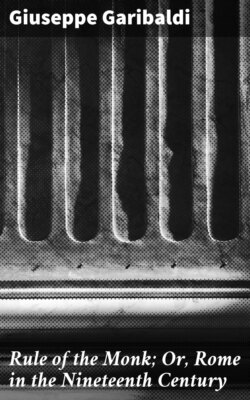Читать книгу Rule of the Monk; Or, Rome in the Nineteenth Century - Garibaldi Giuseppe - Страница 12
На сайте Литреса книга снята с продажи.
CHAPTER V. THE INFANTICIDE
ОглавлениеTable of Contents
Born a peasant, the unhappy Camilla had, like Italy, the fatal gift of beauty. Silvio, who was, by vocation, as we have already said, a wild-boar hunter, used often, in his expeditions to the Pontine Marshes, to rest at the house of the good Marcello, the father of Camilla, whose cottage was situated a short distance from Rome. The young pair became enamored of each other. Silvio demanded her in marriage, and her father, giving a willing consent, they were betrothed.
Perfectly happy and fair to look upon were this youthful pair, as they sat, hand in hand, under the shadows of the vine, watching the gorgeous sunsets of their native clime. This happiness, however, was not of long duration, for, during one of his hunting expeditions, Silvio caught the fever so common in the Pontine Marshes, and, as he continued to suffer for some months, the marriage was indefinitely postponed.
Meanwhile Camilla, who was too lovely and too innocent to dwell in safety near this most vicious of cities, had been marked as a victim by the emissaries of his Eminence, the Cardinal Procopio. It was her custom to carry fruit for sale to the Piazza Navona. On one occasion she was addressed by an old fruit-woman, previously instructed by Gianni, who plied her with every conceivable allurement and flattery, praised her fruit, and promised her the highest price for it at the palace of the cardinal, if she would take it thither. The rest of the story may be too easily imagined. In Rome this is an oft-told tale. To hide from her father and her lover the consequences of her fall, and to suit the convenience of the prelate, Camilla was persuaded to take up her residence in the palace Corsini, where, soon after its birth, her miserable infant was slaughtered by one of its father's murderous ruffians. This so preyed upon the unhappy mother, that she lost her reason, and was secretly immured in a mad-house. On the very night when she effected her escape this meeting was being held, and, after wandering from place to place, for many hours, without any fixed direction, she entered the Colosseum at the moment it was illumined by the lightning, as we have related. That flash disclosed the sentries at the archway, and she rushed towards them, obeying some instinct of safety, or at least perceiving that they were not clothed in the garb of a priest; but they, taking her for a spy, ran forward to make her prisoner. Thereupon, seemingly possessed of supernatural strength, she glided from their hands, and finally eluded their pursuit by running rapidly into the centre of the building, where she fell exhausted in the midst of the three hundred, at the foot of her outraged and ashamed lover.
"It is, indeed, time," said Attilio, when Silvio had related the maniac's story, to purge our city from this priestly ignominy; and drawing forth his dagger, brandished it above his head, as he exclaimed, "Accursed is the Roman who does not feel the degradation of his country, and who is not willing to bathe his sword in the blood of these monsters, who humiliate it, and turn its very soil into a sink."
"Accursed! accursed be they!" echoed back from the old walls, while the sound of dagger-blades tinkling together made an ominous music dedicated to the corrupt and licentious rulers of Rome.
Then Attilio turned to Silvio, and said, "This child is more sinned against than sinning; she requires and deserves protection. You, who are so generous, will not refuse it to her."
And Silvio was, indeed, generous, for he still loved his wretched Camilla, who at sight of him had become docile as a lamb. He raised her, and, enveloping her in his mantle, led her out of the Colosseum towards her father's dwelling.
"Comrades," shouted Attilio, "meet me on the 15th at the Baths of Caracalla. Be ready to use your arms if need be."
"We will be ready! we will be ready!" responded heartily the three hundred, and in a few moments the ruins were left to their former obscure and fearful solitude.
What a wild, improbable story, methinks we hear some of our readers remark, as they sit beside their safe coal fires in free England or the United States. But Popery has not been dominant in England since James II.'s time, and they I have forgotten it. Let them hear that in the year 1848, when a Republican government was established in France, which was the signal of a general revolutionary movement throughout Europe, the present Pope was forced to escape in the disguise of a menial, and a national government granted, for the first time in Rome, religious toleration, one of the first orders of the Roman republic was that the nuns should be liberated, and the convents searched. Guiseppe Garibaldi, in 1849, then recently arrived in Rome, visited himself every convent, and was present during the whole of the investigations. In all, without an exception, he found instruments of torture; and in all, without an exception, were vaults, plainly dedicated to the reception of the bones of infants. Statistics prove that in no city is there so great a number of children born out of wedlock as in Rome; and it is in Rome also that the greatest number of infanticides take place.
This must ever be the case with a wealthy unmarried priesthood and a poor and ignorant population.
